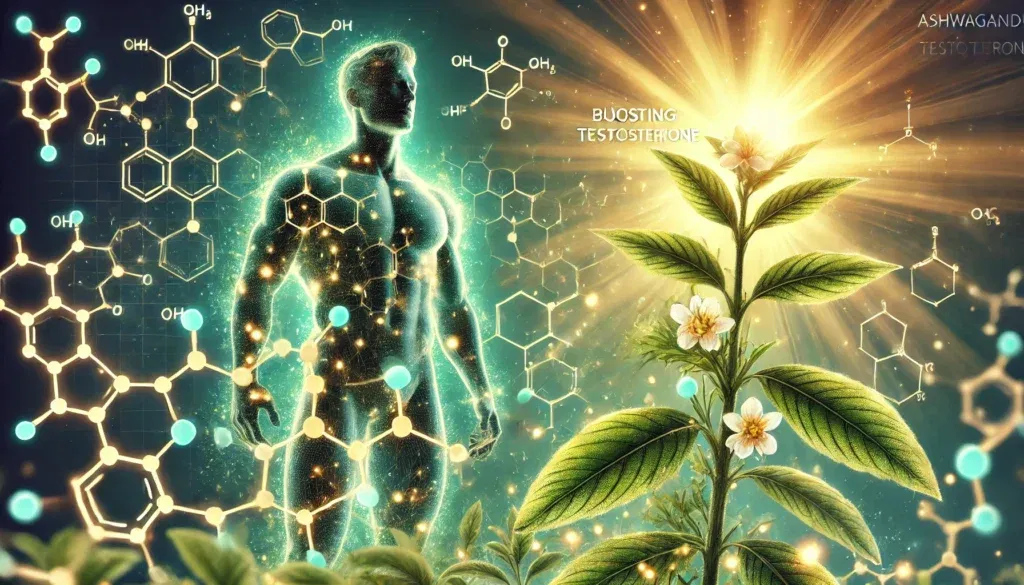Ashwagandha, an adaptogenic herb used for centuries in Ayurvedic medicine, has gained widespread attention for its potential impact on male hormone health. Among its many purported benefits, its ability to influence testosterone levels is one of the most discussed topics in the wellness and fitness communities. Testosterone is the primary male sex hormone responsible for muscle growth, libido, energy levels, and overall vitality. But does ashwagandha increase testosterone? Scientific studies and anecdotal reports suggest that it may play a pivotal role in optimizing hormone levels, but the extent of its effects requires a closer examination.
You may also like: How to Increase Testosterone Levels Naturally: Science-Backed Strategies for Men’s Health & Longevity
Understanding Testosterone and Its Role in Male Health
Testosterone is an androgenic hormone produced primarily in the testes in men, although small amounts are also produced in the adrenal glands. It plays a crucial role in regulating several physiological processes, including muscle mass retention, bone density, fat distribution, mood stability, and reproductive health. As men age, testosterone levels naturally decline, leading to potential symptoms such as decreased libido, fatigue, loss of muscle mass, and cognitive impairments. Many men seek natural methods to maintain or increase their testosterone levels, making ashwagandha a popular herbal supplement for those looking to support their endocrine system.

The Science Behind Ashwagandha and Testosterone
Scientific research has provided compelling evidence regarding the relationship between ashwagandha and testosterone. Multiple clinical studies have examined its impact on hormone levels, particularly in men with stress-induced testosterone depletion and those engaged in strength training. Stress is a known suppressor of testosterone production, as it elevates cortisol, a hormone that inhibits testosterone synthesis. Ashwagandha’s adaptogenic properties help reduce cortisol levels, thereby creating a more favorable environment for testosterone production.
In one landmark study published in the Journal of the International Society of Sports Nutrition, men who supplemented with ashwagandha while participating in resistance training experienced significantly higher increases in testosterone levels compared to a placebo group. Another study conducted on infertile men found that ashwagandha supplementation led to a marked improvement in sperm quality, count, and motility, all of which are linked to healthy testosterone production.
How Ashwagandha Works to Boost Testosterone Levels
Ashwagandha exerts its effects on testosterone through several mechanisms. One primary pathway is its impact on the hypothalamic-pituitary-gonadal (HPG) axis, the regulatory system responsible for hormone balance in men. By modulating this axis, ashwagandha enhances the signaling of luteinizing hormone (LH), which stimulates the testes to produce more testosterone. Additionally, ashwagandha’s ability to combat oxidative stress and inflammation provides further support for hormone synthesis and overall reproductive health.
Furthermore, ashwagandha contains withanolides, bioactive compounds known to enhance cellular function and support endocrine health. These compounds exhibit neuroprotective and anti-stress properties, which help mitigate the negative impact of chronic stress on testosterone production. Given that high cortisol levels are directly linked to reduced testosterone, ashwagandha’s stress-reducing properties play a significant role in maintaining optimal hormone levels.
Does Ashwagandha Increase Testosterone in Young Males?
While testosterone levels are naturally highest in young males, there is still interest in whether ashwagandha can provide additional benefits in this demographic. Some research suggests that young men engaged in athletic training may see improvements in muscle recovery, strength, and endurance due to ashwagandha’s influence on testosterone levels. However, for healthy young males with already high testosterone, the increase may not be as pronounced as in older men or those experiencing testosterone deficiencies. Still, its ability to reduce stress and enhance overall well-being makes it a valuable supplement for young men seeking optimal performance.
The Best Ashwagandha for Testosterone Optimization
Not all ashwagandha supplements are created equal, and selecting a high-quality product is essential for maximizing its benefits. KSM-66 ashwagandha is one of the most well-researched and potent extracts, standardized to contain a high concentration of withanolides. This form has been clinically studied for its effects on testosterone, stress reduction, and athletic performance. Another effective option is Sensoril ashwagandha, which has a slightly different profile but also provides hormonal and cognitive benefits. When choosing an ashwagandha supplement, it is important to look for standardized extracts with third-party testing to ensure purity and efficacy.
Can Ashwagandha Lower Testosterone at All?
One of the concerns regarding herbal supplementation is whether it could have unintended effects on hormone balance. Some individuals worry that ashwagandha might lower testosterone under certain conditions. However, no significant evidence suggests that ashwagandha negatively impacts testosterone levels in healthy individuals. In rare cases, excessive supplementation could lead to hormonal imbalances, particularly if combined with other testosterone-boosting supplements. Moderation and proper dosing are key to ensuring optimal benefits without unwanted side effects.
Does Ashwagandha Affect Other Hormones?
Beyond its impact on testosterone, ashwagandha influences several other hormones that contribute to overall well-being. It has been shown to regulate thyroid function, supporting the production of thyroid hormones crucial for metabolism and energy levels. Additionally, its ability to balance cortisol and promote relaxation makes it beneficial for individuals struggling with adrenal fatigue or chronic stress. Ashwagandha’s holistic impact on the endocrine system reinforces its value as a comprehensive health supplement.
Practical Considerations for Ashwagandha Supplementation
For those interested in incorporating ashwagandha into their regimen, it is important to consider dosage, timing, and individual response. Most studies suggest that doses between 300-600 mg per day provide optimal benefits for testosterone support and stress reduction. Taking ashwagandha with food may enhance absorption and minimize potential digestive discomfort. Since ashwagandha promotes relaxation, some users prefer taking it in the evening to support restful sleep while still reaping its hormonal benefits.

Frequently Asked Questions: Ashwagandha and Testosterone
1. Does ashwagandha increase testosterone levels in all men?
While ashwagandha has been shown to support testosterone production, its effects vary among individuals. Men experiencing chronic stress, fatigue, or low testosterone levels due to aging may see more pronounced benefits. However, young, healthy men with already optimal testosterone levels may not experience a significant increase. Research suggests that ashwagandha and testosterone levels are closely linked through cortisol reduction, meaning those with high stress levels may benefit the most. The degree to which ashwagandha increases testosterone depends on dosage, individual physiology, and lifestyle factors such as diet, exercise, and sleep quality.
2. How much does ashwagandha increase testosterone based on clinical studies?
Clinical studies on ashwagandha’s effect on testosterone levels have shown promising results. In one notable ashwagandha testosterone study, men who supplemented with 600 mg daily saw an increase in testosterone levels by up to 15-20%. Another study involving infertile men found a more substantial rise, with testosterone levels increasing by up to 40%. These variations indicate that the benefits may be more pronounced in those with suboptimal hormone levels. The ability of ashwagandha to boost testosterone is primarily attributed to its impact on reducing oxidative stress and enhancing hormone production in the testes. However, additional factors such as physical activity and stress management may further influence these outcomes.
3. Can ashwagandha increase testosterone naturally without synthetic hormones?
Yes, ashwagandha can naturally support testosterone production without the need for synthetic hormones. It works by optimizing the body’s stress response, improving overall endocrine function, and promoting better energy metabolism. Unlike synthetic testosterone replacement therapy, ashwagandha does not suppress the body’s natural production of hormones but instead encourages a balanced internal environment. Its adaptogenic properties help lower cortisol, a stress hormone that can negatively affect testosterone levels. Thus, when combined with a healthy diet and strength training, ashwagandha can be a natural and sustainable way to enhance testosterone.
4. Does ashwagandha increase testosterone in young males?
For young males, ashwagandha may not cause a drastic testosterone boost since their levels are naturally high. However, it may still provide performance-enhancing benefits, particularly for athletes and bodybuilders. Ashwagandha effects on testosterone are linked to improved strength, muscle mass retention, and recovery in resistance-trained individuals. Furthermore, ashwagandha may contribute to better sleep and reduced stress, which indirectly supports healthy testosterone production. While the benefits may be more pronounced in men with lower levels, young males can still utilize ashwagandha to optimize their hormonal balance and overall well-being.
5. Is ashwagandha good for testosterone and sperm health?
Yes, ashwagandha benefits testosterone production as well as male fertility. Clinical research has shown that ashwagandha supplementation can improve sperm count, motility, and quality in men dealing with fertility issues. This is largely due to its antioxidant properties, which help reduce damage to sperm cells and support reproductive hormone balance. Studies have also indicated that men taking ashwagandha experienced an increase in luteinizing hormone (LH), a key regulator of testosterone and sperm production. These findings suggest that ashwagandha can be beneficial not only for testosterone levels but also for overall reproductive health.
6. Can ashwagandha lower testosterone at all?
There is no substantial evidence suggesting that ashwagandha lowers testosterone in healthy men. However, as with any supplement, excessive or improper use could potentially cause unintended effects. Some users report feeling overly relaxed or experiencing changes in energy levels, which could be due to its stress-reducing properties rather than a direct decrease in testosterone. It is essential to take the recommended dosage and monitor how your body responds. If any concerns arise, consulting a healthcare professional can help ensure safe and effective use of ashwagandha for testosterone support.
7. What is the best ashwagandha for testosterone enhancement?
The best ashwagandha for testosterone optimization is typically a standardized extract such as KSM-66 or Sensoril. KSM-66 ashwagandha is well-researched and has been clinically tested for its impact on testosterone levels, muscle strength, and endurance. Sensoril, another potent extract, is often used for its stress-relieving properties, which can indirectly support testosterone balance. When selecting an ashwagandha supplement, it is crucial to look for high-quality, third-party-tested products to ensure potency and purity. Choosing a supplement with the appropriate dosage (typically between 300-600 mg daily) can maximize its effects on testosterone and overall health.
8. Does ashwagandha boost testosterone when combined with exercise?
Yes, ashwagandha and testosterone levels appear to respond positively to resistance training. Several studies indicate that ashwagandha supplementation can enhance strength gains, muscle recovery, and endurance in men engaged in regular physical activity. Exercise naturally promotes testosterone production, and ashwagandha’s ability to lower cortisol can further support this hormonal balance. Additionally, athletes who use ashwagandha report better stamina and reduced fatigue, both of which contribute to sustained physical performance. For those seeking to increase testosterone, ashwagandha combined with strength training provides a powerful synergistic effect.
9. Does ashwagandha affect testosterone differently in men and women?
While ashwagandha has a notable impact on male testosterone levels, its effects in women are different. Women naturally produce lower levels of testosterone, and ashwagandha primarily supports hormonal balance rather than significantly increasing testosterone in female users. In women, ashwagandha helps regulate cortisol, improve thyroid function, and support adrenal health, all of which contribute to overall hormonal equilibrium. However, some women report enhanced energy, libido, and muscle tone with ashwagandha supplementation, which may be indirectly linked to its influence on androgens. Men, on the other hand, benefit from a more direct increase in testosterone levels due to the herb’s interaction with the endocrine system.
10. Does ashwagandha improve testosterone production over the long term?
Long-term supplementation with ashwagandha appears to support sustained testosterone levels, especially when paired with a healthy lifestyle. Since testosterone decline is often linked to chronic stress, aging, and poor recovery, ashwagandha’s ability to mitigate these factors contributes to its effectiveness over time. However, to maintain optimal benefits, it is recommended to cycle supplementation or take periodic breaks to prevent the body from developing a tolerance. Regular blood tests can help monitor testosterone levels and ensure that ashwagandha is effectively supporting hormone balance. When used correctly, ashwagandha can be a long-term ally in optimizing male hormonal health and vitality.

Final Thoughts: Should You Use Ashwagandha for Testosterone Support?
The growing body of research indicates that ashwagandha can indeed support testosterone production, particularly in men experiencing stress, aging-related declines, or engaging in strength training. Its ability to lower cortisol, enhance reproductive health, and promote overall well-being makes it a valuable addition to a hormone optimization strategy. However, while ashwagandha is a powerful herb, it should be used in conjunction with a healthy lifestyle, proper nutrition, and regular exercise for the best results. As always, consulting a healthcare professional before beginning any new supplement is advisable to ensure safety and efficacy.
ashwagandha testosterone benefits, natural testosterone boosters, adaptogens for hormone health, herbal supplements for men, best ashwagandha supplement, stress and testosterone, KSM-66 vs. Sensoril, ashwagandha and muscle growth, endocrine system support, boosting male vitality, testosterone decline solutions, fitness and hormone balance, natural remedies for stress, cortisol reduction strategies, men’s health supplements, fertility and testosterone, hormone health optimization, herbal medicine for men, testosterone and athletic performance, withanolides benefits
Further Reading:
Does Ashwagandha Increase Testosterone?
Disclaimer: The information provided in this article is for general informational purposes only. The content does not constitute professional advice of any kind, including but not limited to medical, legal, or financial advice. HisHealthMag and its contributors make no representations or warranties regarding the accuracy, completeness, or reliability of the information presented. Always seek the advice of a qualified professional for any specific concerns or questions you may have. Neither HisHealthMag nor its authors assume any responsibility or liability for any actions taken based on the information provided in this article. The views and opinions expressed are those of the author(s) and do not necessarily reflect the official policy or position of HisHealthMag.





